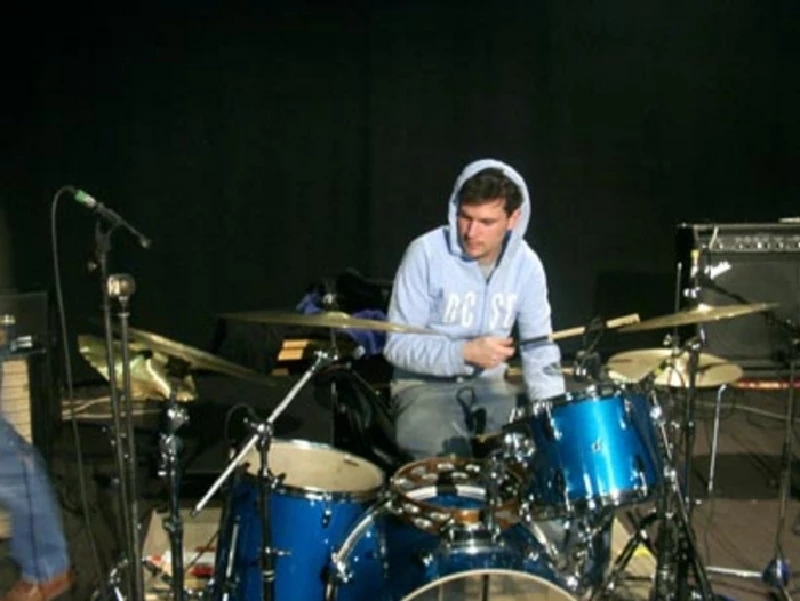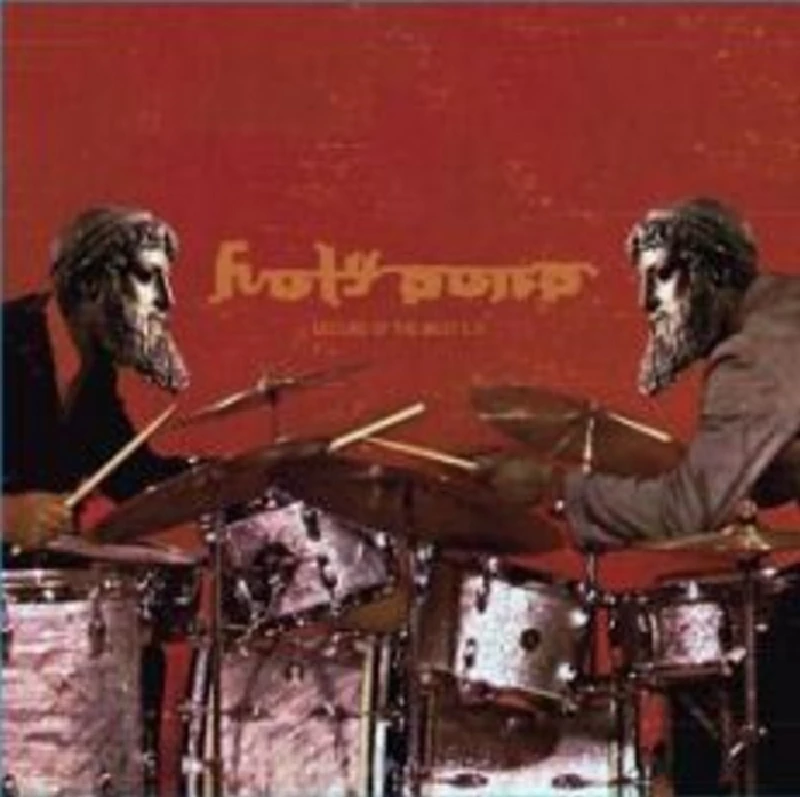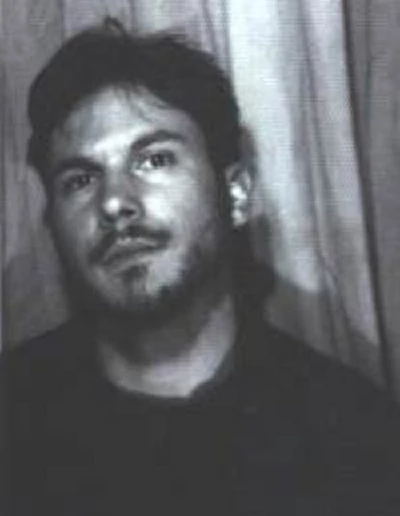Holy Sons - Interview
by John Clarkson
published: 22 / 5 / 2006

intro
Back for a second interview with us, John Clarkson speaks to Grails drummer Emil Amos about his solo project Holy Sons, and its latest record 'Decline of the West', which takes its influence from German philosophy and 70's Avant-Garde and electronic band
Emil Amos is perhaps best known for his work as a drummer with the instrumental Portland-Oregon group Grails, whom have toured Europe twice and have drawn favourable critical comparisons with the Dirty Three, Godspeed You Black Emperor and Mogwai. As well as playing in Grails, the versatile Amos is also fronts his own solo project Holy Sons, which he first formed in 1992, and of which he remains the sole permanent member. Amos recorded three early albums as the Holy Sons, 'Lost Decade'(1999) ; 'Staying True to the Ascetic Roots (2001) and 'Enter the Uninhabitable' (2002), but, refusing to play to the mainstream in any form, did little to promote them and even in his native Portland remained an often neglected talent. His fourth Holy Sons album 'I Want to Live a Peaceful Life'(2003) was recorded with highly-respected local producer Adam Selzer at his Type Foundry studio, the first Holy Sons record not to be recorded on lo-fi equipment. Released on the much-acclaimed Oregon label FILM Guerrero, it did much to push his profile. Amos has now returned with a fifth Holy Sons album, 'Decline of the West', which takes its name from Oswald Spengler's 1920's two volume book in which the German philosopher and historian made the pessimistic assessment that Western culture is showing the classic signs of a societies' decay and end. Influenced by German electronic bands of the 70's, and using nature recordings, radio transmissions and old Halloween tapes, 'Decline of the West', which has been released on the new Italian label Awful Bliss, finds Amos returning to his lo-fi roots and was recorded over a three year period at night in his home studio. As well as singing, Amos also plays all the instruments on it including the guitar, drums, percussion, keyboards, piano and organ. Pennyblackmusic spoke to Amos about 'Decline of the West' and the philosophy that dominates it. PB : You described your last album 'I want to Live a Peaceful Life' as a folk album. You have always said that you want to make albums that are different from one another, and this one seems to take a lot of its influence from German bands of the 70's such as Can and Faust. How would you describe this record ? Would you describe it as an avant-garde record ? ES : Yeah,, the German stuff is addictive listening for sure. That period is so essential in the way that they took apart and then re-built what you can do with the standard 'band' set-up. The biggest influence that pushed me towards thinking more electronically for this record was a record called 'Uberfallig' by Gunter Schickert. I was at the beach in Savannah, Georgia and a huge thunder storm happened late at night. I went out and sat in a jeep and listened to his record while the wind was shaking the jeep back and forth and the lightning was lighting up the sky. It was pretty intense. It took me years to get interested in anything electronic sounding, but the cover image of Gunter Schickert intoxicated me in some sort of VideoDrome way. I pictured him in a dark studio, lit up by the light of the mixing boards, maniacally staring at the LED lights and endlessly looping ominous snaking guitar lines. 'Uberfallig' was recorded at the end of the 70's on the brink of analog gear giving way to the digital mindset. You get the sense he was alive and recording right before the apocalypse overcame his bunker studio somewhere in Berlin. Somehow that image of him synched up with my determination to make serious futuristic music... and somehow the experience of the lightning storm convinced me that there are still things you can do in electronic music that express extremely human things. In terms of it being an Avant-Garde record. That term is complicated... it's an interesting term that means something... - I guess mainly I feel like avant-garde music is ultimately something you end up playing and not necessarily something you set out to do. I'm not super interested in listening to people who set out to make "weird" music. Generally, if you are making raw sounds in a private setting and out of a selfish need to express yourself, it will likely end up being pretty 'Avant-Garde'. People inevitably put the Avant-Garde tag on 'Musique Concrete' after it appeared, but I think it's creators were just interested in sound and the subtle manipulation of it and that's all. What is the purpose of putting the tag 'Avant-Garde' on something that is really just fundamentally 'Natural'? ...and worse, why should actual 'Honesty' be considered and filed away as 'Avant-Garde'? ...That implies something very dire for the human race... That 'Honesty' has become or will always be an exotic commodity. PB : The new album takes its title from Oswald Spengler's book. How did you first come across this book ? ES : I always find myself with the doomsday thinkers. Destruction is good, confusion is good. Pessimism is just a road towards an ultimate positivity. Positivity is definitely my world view's goal... but positivity can shut down key parts of the greater debate too early if negativity isn't honored as a fundamental component for growth/evolution. Jung said, around the time of his death, that we are pitifully unaware of the human psyche and that we have only just begun to study it with any serious intent. Heidegger made it his job to bring things back to a groundfloor of confusion. A lot of the great thinkers seemed to suggest that confusion is where growth and learning begins. To begin to think we have to dive into confusion, embrace the complexities of life and all the negative things they can imply. Spengler is almost like a messenger sent by a God called the Conscience of Society. This conscience rears it's head and periodically sends emissaries to take revenge against a malnourishing societal framework. Carl Sagan described the earth's existence as only just a second in the history of the universe but emphasized that to human beings it seems like an endless lazy Sunday. When things seem to be so hospitable it breeds complacency... and then that complacency breeds outright stupidity and illusory luxuries. I love those writers... sometimes you begin to think they are your only friends... only they were born into different times and places. PB : If positivity is your world view's goal, are you worried then that with a title such as 'Decline of the West' and songs on it with names such as 'Slave Morality', 'Bleakest Picture', 'Evil Falls' and 'Things to Do While Waiting for the Apocalypse', your music might nevertheless as a result be misinterpreted as being more pessimistic than it is. ES : Articulating a complex world view through a piece of art can be like explaining higher math, but with a larger opportunity to be misunderstood. Presenting the bare result of an equation without explaining exactly why it's a compelling problem does nothing to actually teach anyone anything. It would be more helpful to illustrate a guide to the hells you'll have to go through in life (if you want to be delivered) than to suggest that they don't exist. What do people who want to confront serious matters in their life do with blunt statements like 'Don't Worry be Happy'? You have to point an arrow towards redemption or finding Love in the Universe... to just come out and say "Life is Great, Sit back and enjoy the Party" is to do a disservice to the audience's ability to deal with serious issues that lead to a greater understanding of why life is precious. I'm not really interested in naming a record 'Life is Precious' y'know. People often say that music shouldn't be political, but it's unavoidable. All behaviour is constantly political in that it provides an indication of the larger value systems that make up our social dialogue and reality. Music is reflecting our social world and it's various moral erosions or victories in the same way you can turn on the news, go to the mall or watch a movie and see what's so fucked up about the way we view ourselves. The absence of radical music since the 60's or the underground movements in the late 70's/early 80's (to be brief) has left a void and I think people feel malnourished. The state of the world provokes these negative feelings and they shouldn't paralyze us when, in theory, those feelings could deliver us. PB : The record features two covers, one of Daniel Johnston's 'Nothing's Left' and one of Eric Gaffney's 'Level Anything'. You have played gigs with both of these musicians. Why did you decide to include these on the album? ES : I'm not sure what to say about them exactly. I can't escape my past and when I was a teenager I basically felt there were no better songwriters in the world than those two. Daniel Johnston's stuff helped me through some of the worst times of my life when I wasn't functioning too well. Eric Gaffney was much more of a male force for me ...he was a huge inspiration and a total mystery. I felt comforted by the thought that there was someone else out there that felt that much anger and had such a lack of respect for the way music is supposed to sound. I mainlined that chaos into my blood at a young age and couldn't really listen to many other things after that for a long time. A lot has happened since then, I've played and hung out with those guys and I still feel strongly about them. I don't think I've ever felt as emotional at a show as when I played with Daniel Johnston... and Eric's still making some really rad songs. PB : You employ a vast lot of instrumentation on 'The Decline of the West', all of which you played itself. Recording of the album must have involved a lot of multi-tracking and mixing and re-mixing. Did it take a lot of hours and patience to pull each track together ? ES : Most of my frustration was conceptual but there were things about the technical aspect that made me sort of neurotic after listening to them over and over. It was more important to me to build a new template for Holy Sons. to move forward stylistically and not get stuck in the folk-singer ghetto which is currently commodifying what we would have called "honesty". Now that the record is made, I'm having a much easier time visualizing the trajectory of the next few records. 'Decline' was something of a major curve in the road that I had to get past. You have to accelerate into those curves instead of leaning back on structures that have worked before. Making records by myself in a basement room is what Holy Sons was founded on and the music should probably stay in somewhat of an isolated environment to maintain the nature of the process. Holy Sons is basically the act of recording myself. It's important for making records to be fun and therapeutic for me and not to be about deadlines, expectations or press releases. PB : After years of self-imposed obscurity, the Holy Sons have, after 'I Want to Live a Peaceful Life', had a slightly larger profile and have, after playing just four or five gigs throughout the 90's, been playing more shows. How easy has it been transferring what is essentially a one man home project to the stage ? ES : I don't or can't really think about it anymore. Either the difficulties of getting a message to people are too paralyzing to think about it or my psyche doesn't let me enjoy the benefits very much. What was an uncomfortable situation before, whether it was presenting myself in the live format, promoting Holy Sons music in general or just crossing the street, has become just 'the way it is'. Whether or not I am ultimately musically received on larger levels doesn't have an impact on the music I make or how often I put out records. I find myself somewhat forced to ignore the social environments around me just so I can focus on what I'm doing and get it done. When I was a kid, everyday I was bummed about the inevitably solitary fate of my musical situation... but I can really only blame myself for not feeling like playing the career game. Eventually I came to see a power in solitude... things have become a lot more comfortable and as I approach a healthier way of looking at my situation I think I'll be able to make better music. Now my mind is focused on maintaining a solipsistic equilibrium and avoiding any depression that might inhibit my ability to express myself. PB : Thank you.
Picture Gallery:-

interviews |
|
Interview (2003) |

|
| Emil Amos's band Holy Sons spent a decade in self-imposed musical exile, but have now released an album 'I Want to Live a Peaceful Life' through FILM Guerrero. He chats about it, and the other albums and EPs he has planned for the near future |
most viewed articles
current edition
Peter Doherty - Blackheath Halls, Blackheath and Palace Halls, Watford, 18/3/2025 and 21/3/2025Armory Show - Interview with Richard Jobson
Liz Mitchell - Interview
Lauren Mayberry - Photoscapes
Deb Googe and Cara Tivey - Interview
Max Bianco and the BlueHearts - Troubadour, London, 29/3/2025
Garfunkel and Garfunkel Jr. - Interview
Sukie Smith - Interview
Maarten Schiethart - Vinyl Stories
Clive Langer - Interview
previous editions
Heavenly - P.U.N.K. Girl EPBoomtown Rats - Ten Songs That Made Me Love....
Trudie Myerscough-Harris - Interview
Doris Brendel - Interview
Oasis - Oasis, Earl's Court, London, 1995
Beautiful South - Ten Songs That Made Me Love...
Dwina Gibb - Interview
Pulp - Ten Songs That Made Me Love...
Kay Russell - Interview with Kay Russell
Sound - Interview with Bi Marshall Part 1
most viewed reviews
current edition
Davey Woodward - Mumbo in the JumboNigel Stonier - Wolf Notes
Wings - Venus and Mars
Kate Daisy Grant and Nick Pynn - Songs For The Trees
Only Child - Holy Ghosts
Neil Campbell - The Turnaround
Philip Jeays - Victoria
Darkness - Dreams On Toast
Suzanne Vega - Flying With Angels
Charles Ellsworth - Cosmic Cannon Fodder
Pennyblackmusic Regular Contributors
Adrian Janes
Amanda J. Window
Andrew Twambley
Anthony Dhanendran
Benjamin Howarth
Cila Warncke
Daniel Cressey
Darren Aston
Dastardly
Dave Goodwin
Denzil Watson
Dominic B. Simpson
Eoghan Lyng
Fiona Hutchings
Harry Sherriff
Helen Tipping
Jamie Rowland
John Clarkson
Julie Cruickshank
Kimberly Bright
Lisa Torem
Maarten Schiethart